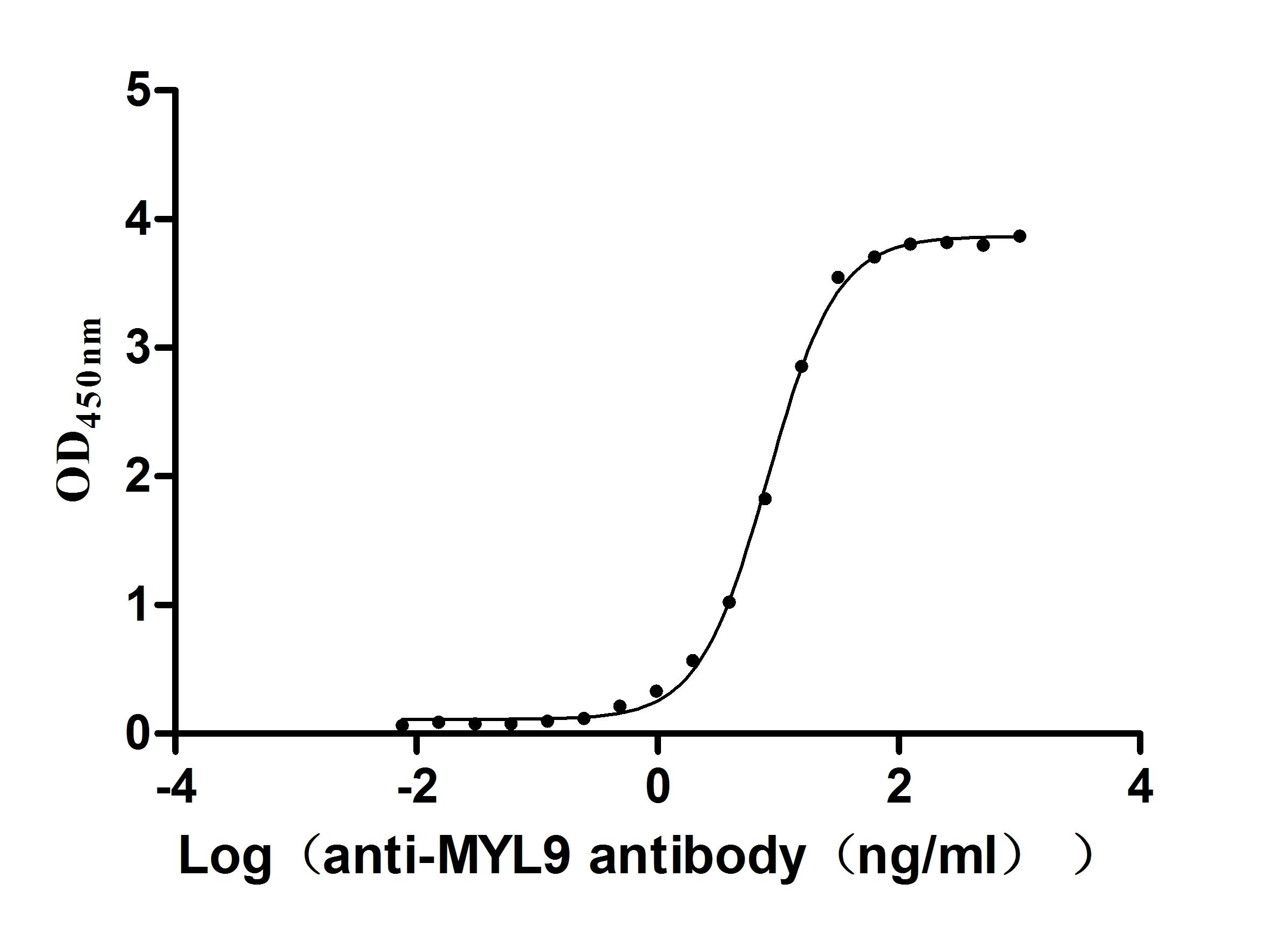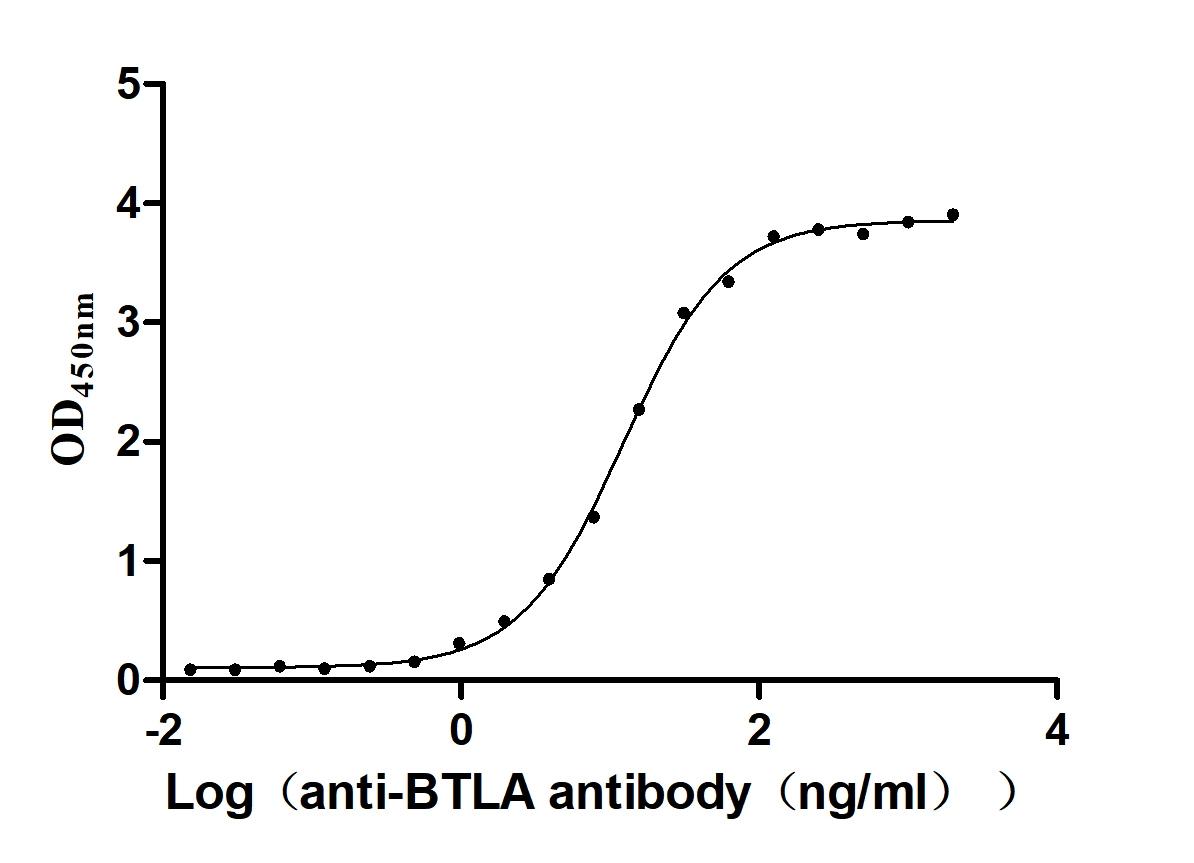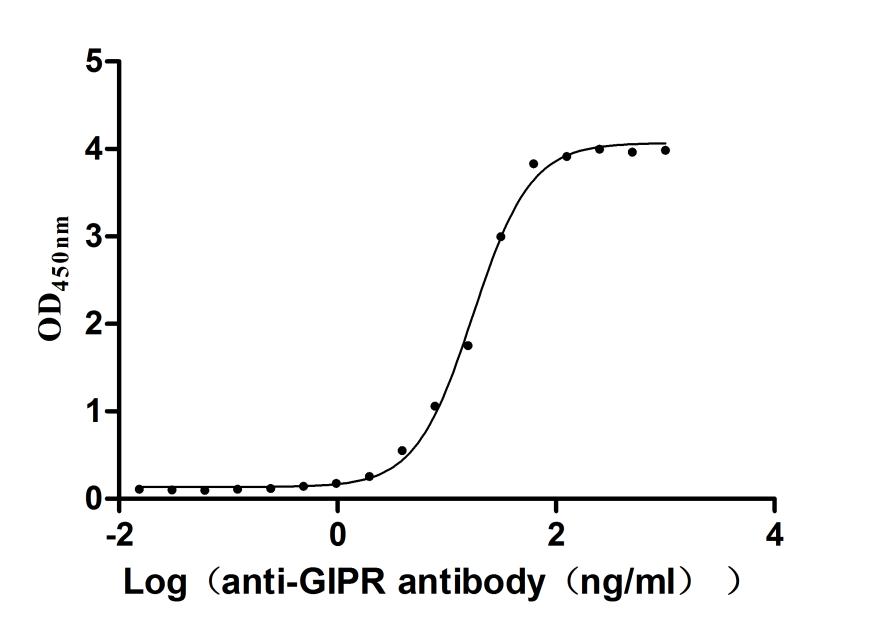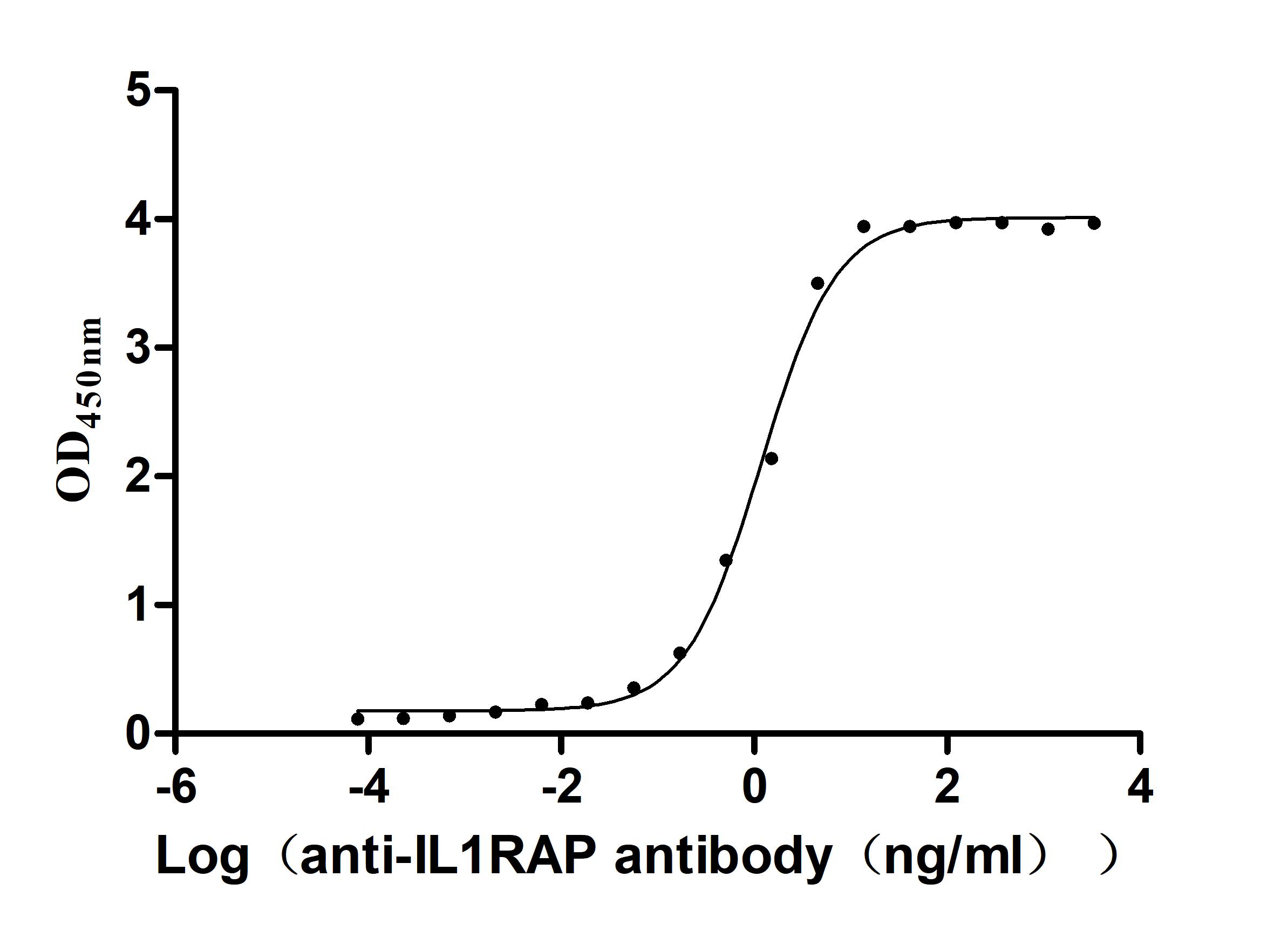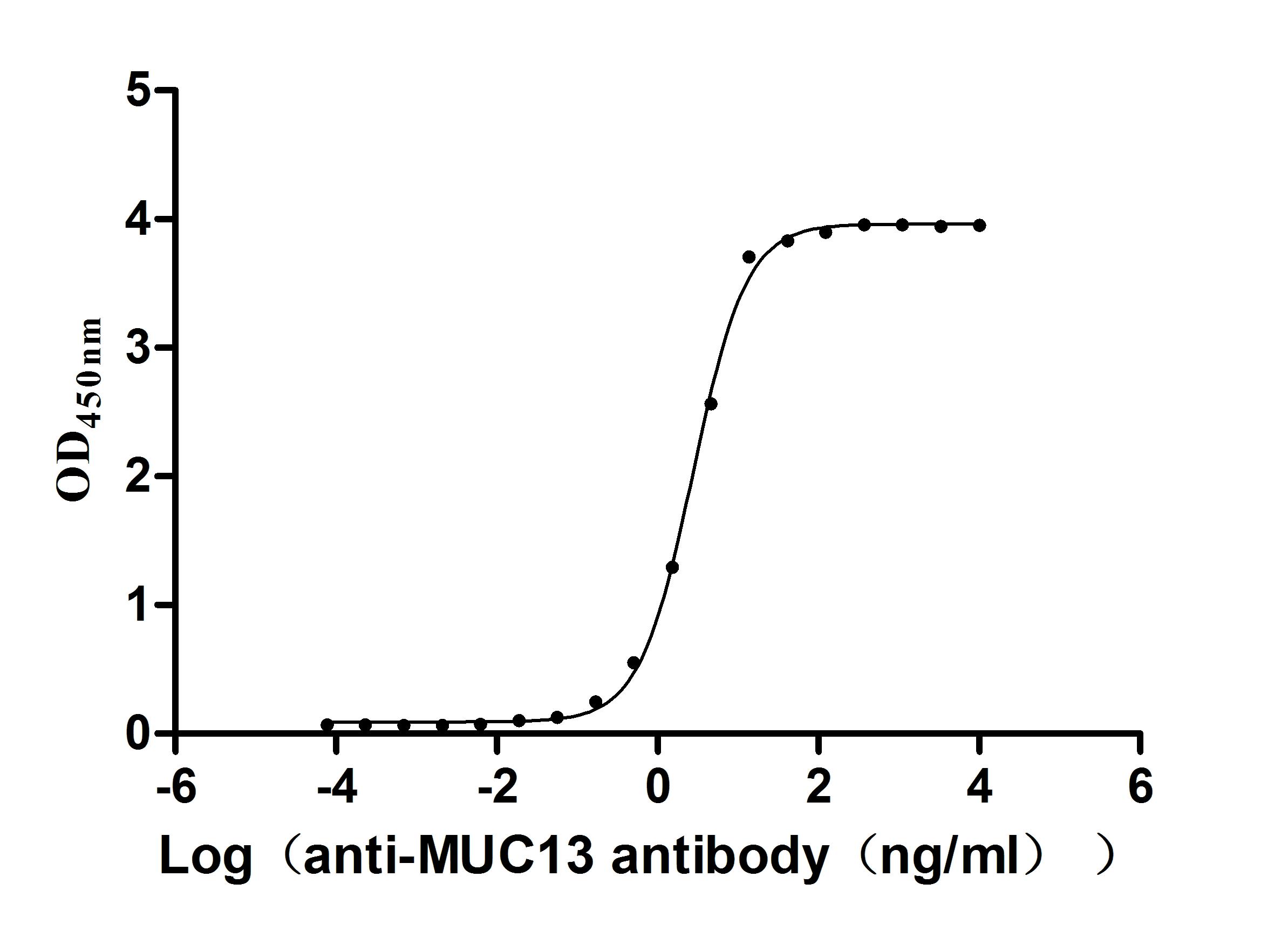Recombinant Human Serine/arginine-rich splicing factor 2 (SRSF2), partial
-
中文名称:人SRSF2重组蛋白
-
货号:CSB-YP021152HU
-
规格:
-
来源:Yeast
-
其他:
-
中文名称:人SRSF2重组蛋白
-
货号:CSB-EP021152HU
-
规格:
-
来源:E.coli
-
其他:
-
中文名称:人SRSF2重组蛋白
-
货号:CSB-EP021152HU-B
-
规格:
-
来源:E.coli
-
共轭:Avi-tag Biotinylated
E. coli biotin ligase (BirA) is highly specific in covalently attaching biotin to the 15 amino acid AviTag peptide. This recombinant protein was biotinylated in vivo by AviTag-BirA technology, which method is BriA catalyzes amide linkage between the biotin and the specific lysine of the AviTag.
-
其他:
-
中文名称:人SRSF2重组蛋白
-
货号:CSB-BP021152HU
-
规格:
-
来源:Baculovirus
-
其他:
-
中文名称:人SRSF2重组蛋白
-
货号:CSB-MP021152HU
-
规格:
-
来源:Mammalian cell
-
其他:
产品详情
-
纯度:>85% (SDS-PAGE)
-
基因名:SRSF2
-
Uniprot No.:
-
别名:35 kDa; arginine/serine-rich 2; PR264; Protein PR264; SC 35; SC-35; SC35; Serine/arginine-rich splicing factor 2; SFRS 2; SFRS2; SFRS2A; Splicing component 35 kDa; Splicing component; Splicing factor; Splicing factor arginine/serine rich 2; Splicing factor SC35; Splicing speckle; Splicing speckles; SR splicing factor 2; SRp30b; SRSF2; SRSF2_HUMAN
-
种属:Homo sapiens (Human)
-
蛋白长度:partial
-
蛋白标签:Tag type will be determined during the manufacturing process.
The tag type will be determined during production process. If you have specified tag type, please tell us and we will develop the specified tag preferentially. -
产品提供形式:Lyophilized powder
Note: We will preferentially ship the format that we have in stock, however, if you have any special requirement for the format, please remark your requirement when placing the order, we will prepare according to your demand. -
复溶:We recommend that this vial be briefly centrifuged prior to opening to bring the contents to the bottom. Please reconstitute protein in deionized sterile water to a concentration of 0.1-1.0 mg/mL.We recommend to add 5-50% of glycerol (final concentration) and aliquot for long-term storage at -20℃/-80℃. Our default final concentration of glycerol is 50%. Customers could use it as reference.
-
储存条件:Store at -20°C/-80°C upon receipt, aliquoting is necessary for mutiple use. Avoid repeated freeze-thaw cycles.
-
保质期:The shelf life is related to many factors, storage state, buffer ingredients, storage temperature and the stability of the protein itself.
Generally, the shelf life of liquid form is 6 months at -20°C/-80°C. The shelf life of lyophilized form is 12 months at -20°C/-80°C. -
货期:Delivery time may differ from different purchasing way or location, please kindly consult your local distributors for specific delivery time.Note: All of our proteins are default shipped with normal blue ice packs, if you request to ship with dry ice, please communicate with us in advance and extra fees will be charged.
-
注意事项:Repeated freezing and thawing is not recommended. Store working aliquots at 4°C for up to one week.
-
Datasheet :Please contact us to get it.
相关产品
靶点详情
-
功能:Necessary for the splicing of pre-mRNA. It is required for formation of the earliest ATP-dependent splicing complex and interacts with spliceosomal components bound to both the 5'- and 3'-splice sites during spliceosome assembly. It also is required for ATP-dependent interactions of both U1 and U2 snRNPs with pre-mRNA. Interacts with other spliceosomal components, via the RS domains, to form a bridge between the 5'- and 3'-splice site binding components, U1 snRNP and U2AF. Binds to purine-rich RNA sequences, either 5'-AGSAGAGTA-3' (S=C or G) or 5'-GTTCGAGTA-3'. Can bind to beta-globin mRNA and commit it to the splicing pathway. The phosphorylated form (by SRPK2) is required for cellular apoptosis in response to cisplatin treatment.
-
基因功能参考文献:
- mutations in myelodysplasia patients preferentially affect splicing at 3' splice sites rather than at 5' splice sites PMID: 30194306
- SRSF2 mutations were significantly related to the shorter OS in patients with myelodysplastic syndromes which may consider as an adverse prognostic risk factor. Whereas, analysis did not show any prognostic effect on overall-survival of chronic myelomonocytic leukemia patients with SRSF2 mutations. PMID: 29757120
- SRSF2 is highly expressed in hepatocellular carcinoma and its expression increases with the degree of tumor differentiation and TNM staging. It is related to lymph node metastasis and metastasis of tumor cells, and is positively related to serum alpha fetoprotein content, and affects the postoperative survival time of HCC patients. PMID: 29278882
- We found that SON and SC35 (also known as SRSF2) localize to the central region of the speckle, whereas MALAT1 and small nuclear (sn)RNAs are enriched at the speckle periphery. PMID: 29133588
- Through a serial mutagenesis, s demonstrate that a 10 nt RNA sequence surrounding the branch-point (BP), is important for SRSF2-mediated inhibition of cassette exon inclusion through directly interacting with SRSF2. PMID: 28712387
- The aberrantly spliced target genes and deregulated cellular pathways associated with the commonly mutated splicing factor genes in myelodysplastic syndromes (SF3B1, SRSF2 and U2AF1) are being identified, illuminating the molecular mechanisms underlying the disease. (Review) PMID: 27639445
- adverse prognostic impact of SRSF2 mutations on OS and AML transformation in patients with de novo MDS PMID: 28953917
- SRSF2 mutation is associated with chronic myelomonocytic leukemia. PMID: 28209919
- Posttranslational modification of SR proteins underlies the regulation of their mRNA export activities and distinguishes pluripotent from differentiated cells. PMID: 28592444
- Mutation in SRSF2 gene is associated with Uveal Melanoma. PMID: 28810145
- Myelodysplastic syndrome -related P95 point mutants of SRSF2 lead to alternative splicing of CDC25C in a manner that is not dependent on the DNA damage response. PMID: 27552991
- Findings identify SRSF2 as a key regulator of RNA splicing dysregulation in cancer, with possible clinical implications as a candidate prognostic factor in patients with HCC. PMID: 28082404
- depletion of the splicing factor arginine-rich splicing factor 2 (SRSF2) leads to enhanced cytotoxicity of breast cancer cells by KM100 PMID: 26257065
- Data suggest that RBM25 is required for the viability of multiple human cell lines, suggesting that it could play a key role in pre-mRNA splicing; a region of RBM25 spanning Lys77 binds with high affinity to SRSF2, a crucial protein in exon definition, but only when Lys77 is unmethylated. (RBM25 = RNA binding motif protein 25; SRSF2 = serine- and arginine-rich splicing factor 2) PMID: 28655759
- mutations in the SRSF2/ASXL1/RUNX1 gene panel identified as significant prognostic markers in systemic mastocytosis PMID: 27416984
- It was found that the absence of mutations in the SRSF2, ASXL1, and/or RUNX1gene panel at baseline and a reduction of the KIT D816V allele burden more than 25% at month 6 are the most favorable predictors for improved survival in midostaurin-treated advanced systemic mastocytosis patients. PMID: 28424161
- These findings provide insight into the functions of SRSF2 in HSV-1 replication and gene expression. PMID: 27784784
- SRSF2 mutations were identified in Chinese AML patients. Patients with SRSF2 mutations were older than those with wild-type. No differences in the sex, blood parameters, FAB subtypes, and karyotypes were seen between AML patients with and without SRSF2 mutations. SRSF2 mutation was not an independent prognostic factor in AML patients. PMID: 26820131
- The genotype frequencies of SRSF2 SNP rs237057 were CT 7.6% and TT 92.4% in Childhood AML patients. PMID: 25553291
- We present experimental evidence that splicing factor SRSF1, SRSF2, U2AF35, U2AF65 and KHSRP expression levels in gastrointestinal tract (colon, gastric and pancreatic) tumors differ compare to healthy tissues and in cell lines. PMID: 26406946
- Data show that tet methylcytosine dioxygenase 2 TET2, isocitrate dehydrogenases 1/2 IDH1/IDH2, serine/arginine-rich splicing factor 2 SRSF2, splicing factor 3b subunit 1 SF3B1, and ras proteins (KRAS/NRAS) are not conserved in dog mast Cell tumors. PMID: 26562302
- Depletion of two of the most potent inhibitors of SMP2 exon 7 inclusion, SRSF2 or SRSF3, in cell lines derived from SMA patients, increased SMN2 exon 7 inclusion and SMN protein level. PMID: 25506695
- HIV-1-Tat Protein Inhibits SC35-mediated Tau Exon 10 Inclusion through Up-regulation of DYRK1A Kinase. PMID: 26534959
- Our results show that diverse microenvironment cues affect different attributes of the SC-35 organizational metrics and lead to distinct emergent organizational patterns. PMID: 25765854
- findings shed light on the mechanism of the disease-associated SRSF2 mutation in splicing regulation and also reveal a group of misspliced mRNA isoforms for potential therapeutic targeting PMID: 26261309
- The s propose that splicing at 3'ss A3 is dependent on binding of the enhancing SR proteins SRSF2 and SRSF6 to the HIV-1 tat ESE and ESE2 sequence. PMID: 25889056
- clinical relevance of SRSF2 mutations in Chinese myelodysplastic syndrome PMID: 25541999
- SRSF2 mutations are frequent in chronic myelomonocytic leukemia patients, but show a relatively lower incidence in Chinese patients. PMID: 25533824
- SRSF2 splicing factor gene mutations diagnose myelodysplastic syndromes. PMID: 25445211
- The mutational status of the SRSF2, U2AF1 and ZRSR2 did not affect the response rate or survival in MDS patients who had received first-line decitabine treatment. PMID: 25964599
- SRSF2 is required for expression of HPV16 E6E7 mRNAs in cervical tumor but not nontumor cells and may act by inhibiting their decay. PMID: 25717103
- Mutation in SRSF2 gene is associated with secondary acute myeloid leukemia. PMID: 25550361
- acts in concert with OCT4 and miRNAs to mediate protein diversity via alternative splicing enforcing a state of pluripotency PMID: 24813856
- SRSF2-p95 hotspot mutation is highly associated with advanced forms of mastocytosis and mutations in epigenetic regulator genes. PMID: 24389310
- Molecular monitoring of patients having undergone AHSCT for PMF should not be restricted to JAK2, MPL or CALR, but all mutations present in primary fibrotic neoplastic myeloproliferation should be included to interpret abnormal blood values after AHSCT PMID: 25231745
- The SRSF2 is a unique SR protein that activates transcription in a position-dependent manner while three other SR proteins enhance translation in a position-independent fashion. PMID: 24406341
- SRSF2 mutations are frequent in chronic myelomonocytic leukemia and a useful diagnostic feature demonstrable in BM biopsies, allowing a definitive diagnosis for cases with minimal dysplasia and normal karyotype. PMID: 25305095
- SRSF2 promotes exon 11 inclusion of Ron proto-oncogene through targeting exon 11. PMID: 25220236
- Protein kinase A interacts with and phosphorylates SC35 and enhances SC35-promoted tau exon 10 inclusion. PMID: 24037441
- SC35 promotes the production of the C5-V6-C6 isoform of CD44. Knockdown of SC35 reduces the expression of the CD44V6 isoform. PMID: 24173428
- SETBP1 and SRSF2 are the most common somatic genetic abnormalities in patients with myeloid neoplasms carrying isochrmosome 17(q10), and may be important drivers of disease pathogenesis. PMID: 24796269
- The SC35 exonic splicing enhancer motif is conserved within the same chromosome but not between different human chromosomes. PMID: 24792892
- IDH mutations were closely associated with mutations of DNMT3A, ASXL1, and SRSF2, suggesting the interaction of IDH mutations with these gene aberrations may play a role in the development of MDS. PMID: 24115220
- Data show that myelodysplastic chronic myelomonocytic leukemias are characterized by mutations in transcription/epigenetic regulators ASXL1, RUNX1, TET2 and SRSF2. PMID: 23065512
- A new function of the splicing factor SRSF2 in the control of E2F1-mediated cell cycle progression in neuroendocrine lung tumors. PMID: 23518498
- In primary myelofibrosis, SRSF2 mutation appears to be stable and not associated with progression from previous thrombocytosis to cytopenia. PMID: 23660863
- data suggest that SF3B1, U2AF1 and SRSF2 mutations occur not only in myeloid lineage tumors but also in lymphoid lineage tumors; data suggest that the splicing gene mutations play important roles in the pathogenesis of hematologic tumors, but rarely in solid tumors PMID: 23280334
- SRSF2 is the most frequently mutated spliceosome gene in chronic myelomonocytic leukemia, but neither it nor SF3B1 or U2AF35 mutations are prognostically relevant. PMID: 23335386
- In 187 primary myelofibrosis patients, 17% had SRSF2 mutations at P95. They were associated with shorter survival. PMID: 22968464
- SRSF2 mutations are associated with chronic myelomonocytic leukemia PMID: 22919025
显示更多
收起更多
-
亚细胞定位:Nucleus. Nucleus, nucleoplasm. Nucleus speckle. Note=Phosphorylation by SRPK2 provokes its redistribution from the nuclear speckle to nucleoplasm.
-
蛋白家族:Splicing factor SR family
-
数据库链接:
HGNC: 10783
OMIM: 600813
KEGG: hsa:6427
STRING: 9606.ENSP00000353089
UniGene: Hs.584801
Most popular with customers
-
Recombinant Human Myosin regulatory light chain 12B(MYL12B) (Active)
Express system: E.coli
Species: Homo sapiens (Human)
-
Recombinant Human B- and T-lymphocyte attenuator(BTLA), partial (Active)
Express system: Mammalian cell
Species: Homo sapiens (Human)
-
Recombinant Human Gastric inhibitory polypeptide receptor(GIPR),partial (Active)
Express system: Mammalian cell
Species: Homo sapiens (Human)
-
Recombinant Human Interleukin-1 receptor accessory protein (IL1RAP), partial (Active)
Express system: Mammalian cell
Species: Homo sapiens (Human)
-
Recombinant Human Mucin-13(MUC13),partial (Active)
Express system: yeast
Species: Homo sapiens (Human)


